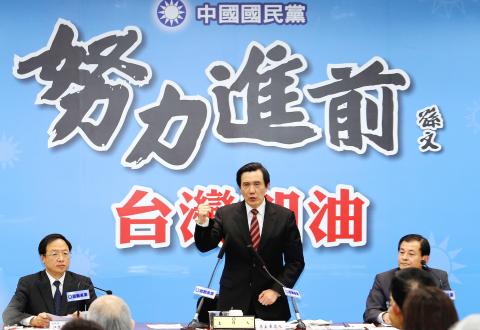One day after Legislative Speaker Wang Jin-pyng (王金平) delivered a pledge that could substantially delay the review of the cross-strait service trade agreement by the legislature, President Ma Ying-jeou (馬英九) met with Chinese Nationalist Party (KMT) lawmakers last night to devise a response.
Wang on Sunday promised the Sunflower movement students occupying the legislative chamber he would not convene any inter-party negotiations on the pact before the legislature enacts a law to monitor cross-strait negotiations and agreements, which many believe would effectively freeze the pact, the status of which has been disputed among lawmakers during the legislative process.
Wang’s offer was welcomed by the students, who have demanded that a mechanism to monitor cross-strait talks be established before a review of the pact begins, but the Presidential Office and the Executive Yuan both said that they had been taken surprise by Wang’s statement.

Photo: CNA
Some KMT lawmakers said they felt “betrayed” by Wang.
KMT lawmakers were ordered to attend the caucus meeting at 6pm yesterday at the party’s headquarters presided over by Ma, who is also KMT chairman, and attended by Premier Jiang Yi-huah (江宜樺) or face party discipline.
Earlier yesterday, some KMT lawmakers voiced their support for Wang.
Those who cannot come up with better ways to resolve the situation than the one Wang offered should “shut up,” KMT Legislator Huang Chao-shun (黃昭順).
KMT Legislator Lai Shyh-bao (賴士葆) suggested that a referendum be called to decide the fate of the pact because it would be naive to think that the agreement would be ratified by the legislature after the Sunflower movement.
Late last night, after the students announced that they would leave the legislative chamber at 6pm on Thursday, Ma issued a statement commending the students’ decision.
Returning the legislature to normal operation so lawmakers can review bills concerning people’s livelihoods met the public’s expectations, Ma said.
Ma said that Wang’s pledge did not conflict with the government’s position that the agreement should be reviewed article-by-article in the legislature.
However, Ma and Jiang both reiterated that the legislature should continue its review of the service trade agreement while it deliberates the proposed legislation on establishing a monitoring mechanism for cross-strait negotiations.
If an oversight bill has to be enacted before the cross-strait service trade agreement can be reviewed, “we can only expect to see the economy decline” from now until 2016 because it could take as long as two years to pass the bill, Jiang said.
The delay in ratifying the service trade agreement could negatively affect cross-strait negotiations on trade in goods and hinder the nation’s bid to join the negotiations on the Trans-Pacific Partnership and to join the Regional Comprehensive Economic Partnership, Jiang said.
Ma called on KMT lawmakers to enact an oversight bill before the legislative session ends in the middle of the year.
He also urged opposition lawmakers not to boycott the service trade pact, saying that otherwise, they would not meet the public’s expectations.

A Ministry of Foreign Affairs official yesterday said that a delegation that visited China for an APEC meeting did not receive any kind of treatment that downgraded Taiwan’s sovereignty. Department of International Organizations Director-General Jonathan Sun (孫儉元) said that he and a group of ministry officials visited Shenzhen, China, to attend the APEC Informal Senior Officials’ Meeting last month. The trip went “smoothly and safely” for all Taiwanese delegates, as the Chinese side arranged the trip in accordance with long-standing practices, Sun said at the ministry’s weekly briefing. The Taiwanese group did not encounter any political suppression, he said. Sun made the remarks when

The Taiwanese passport ranked 33rd in a global listing of passports by convenience this month, rising three places from last month’s ranking, but matching its position in January last year. The Henley Passport Index, an international ranking of passports by the number of designations its holder can travel to without a visa, showed that the Taiwan passport enables holders to travel to 139 countries and territories without a visa. Singapore’s passport was ranked the most powerful with visa-free access to 192 destinations out of 227, according to the index published on Tuesday by UK-based migration investment consultancy firm Henley and Partners. Japan’s and

BROAD AGREEMENT: The two are nearing a trade deal to reduce Taiwan’s tariff to 15% and a commitment for TSMC to build five more fabs, a ‘New York Times’ report said Taiwan and the US have reached a broad consensus on a trade deal, the Executive Yuan’s Office of Trade Negotiations said yesterday, after a report said that Washington is set to reduce Taiwan’s tariff rate to 15 percent. The New York Times on Monday reported that the two nations are nearing a trade deal to reduce Taiwan’s tariff rate to 15 percent and commit Taiwan Semiconductor Manufacturing Co (TSMC, 台積電) to building at least five more facilities in the US. “The agreement, which has been under negotiation for months, is being legally scrubbed and could be announced this month,” the paper said,

MIXED SOURCING: While Taiwan is expanding domestic production, it also sources munitions overseas, as some, like M855 rounds, are cheaper than locally made ones Taiwan and the US plan to jointly produce 155mm artillery shells, as the munition is in high demand due to the Ukraine-Russia war and should be useful in Taiwan’s self-defense, Armaments Bureau Director-General Lieutenant General Lin Wen-hsiang (林文祥) told lawmakers in Taipei yesterday. Lin was responding to questions about Taiwan’s partnership with allies in producing munitions at a meeting of the legislature’s Foreign Affairs and National Defense Committee. Given the intense demand for 155mm artillery shells in Ukraine’s defense against the Russian invasion, and in light of Taiwan’s own defensive needs, Taipei and Washington plan to jointly produce 155mm shells, said Lin,